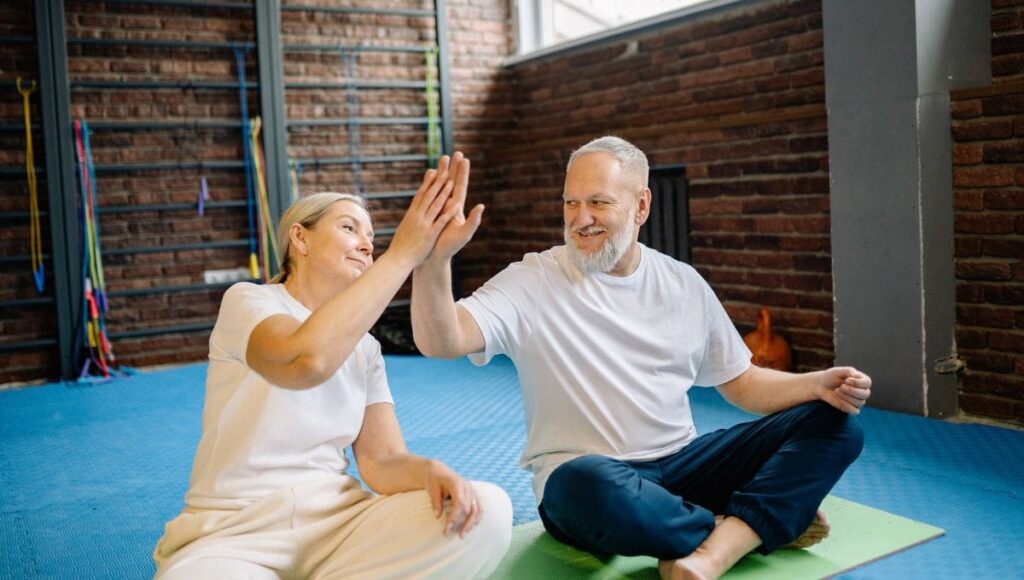Check out the 5 worst pieces of advice for a long life that you should completely disregard if you want to live a healthy enduring life.
When people practice fitness, there are a couple of distinct reasons why. Most people simply want to be stronger, fitter, more athletic, or (let’s be honest) just look nicer and change their physique.
However, there is a growing number of people who go under fitness exercises and regimes to become healthier and live longer without problems associated with ageing. And this is when the internet and the plethora of information available can be confusing.
Not all claims online, however well-intentioned they might be, are backed by strong scientific evidence. And sometimes it could be even harmful to what you are trying to achieve. And that is what Thomas DeLauer decided to shine a light on in a video he shared.

Thomas DeLauer is a celebrity trainer and health author. His YouTube Channel has 3 million subscribers and he has been on the cover of numerous international magazines.
Using his knowledge as a basis, this article aims to shed light on some of the most bogus longevity claims, focusing on practices that may seem promising but lack robust scientific support. At the end of the page, you will find all the research used for the claims made.
Related: 9 Simple Tips to Live Longer
The 5 Worst Pieces of Advice for a Long Life (You Should Never Listen To)
- Stem Cell Treatment for Longevity
While stem cell treatments show promise in various medical applications, their efficacy in extending human lifespan remains questionable. The focus on hematopoietic cells, specifically blood stem cells, lacks strong human research. Despite some positive results in rodent models, the relevance to human longevity is uncertain, given the controlled environments of these studies.
The high cost, potential risks, and weak scientific backing make stem cell treatment for longevity a weak science offender. Caution is advised until more robust human data emerges.
- Low Protein Diet for Longevity
A recent study suggesting that a low-protein diet promotes longevity raised eyebrows, but a closer look reveals flaws. The study recommends extremely low protein intake and the complete elimination of red meat, which may not be suitable for everyone.
Contrary to the study’s claims, increasing protein intake, especially in conjunction with resistance training, has proven benefits for strength and muscle mass. The reductionist approach of focusing on a single amino acid, methionine, neglects the overall importance of protein for maintaining health, strength, and resilience as individuals age.

3 Habits You Should Have to Stay Young
- Grass-Finished Meat Delivered to Your Doorstep with Butcher Box
While opting for high-quality, grass-finished meat is a commendable choice for those seeking optimal nutrition, it’s essential to recognize the limitations of such claims. The link between grass-finished meat and longevity is not as straightforward as some marketing messages may suggest.
Grass-finished meat does offer potential health benefits, including higher levels of omega-3 fatty acids and certain vitamins. However, overstating the direct impact of consuming this type of meat on life expectancy is misleading. Longevity is a complex outcome influenced by various factors, including overall diet, lifestyle, and genetic predispositions.
Furthermore, the association between specific types of meat and longevity is a topic of ongoing research. While grass-finished meat can contribute to a nutrient-rich diet, it should be viewed as part of a comprehensive approach to health rather than a singular solution.
- Resveratrol Supplementation
Resveratrol, a compound found in red wine and certain foods, gained popularity for its potential anti-ageing properties. However, the strongest evidence comes from fruit fly studies, raising questions about its applicability to humans.
While Resveratrol may have some health benefits, its limited bioavailability and inconsistent results in human studies challenge its role as a longevity elixir. The price increase in Resveratrol supplements underscores the growing interest in longevity-related products.
- Cold Plunge for Longevity
The trend of cold plunges, often promoted as a longevity practice, lacks solid scientific support. Early studies on rats and fruit flies showed correlations between exposure to cold and certain markers associated with lifespan, but translating these findings to humans is problematic.
Excessive cold plunging may create stress rather than promote longevity, especially for individuals already engaging in intense physical activities. Research suggests that frequent cold plunges might interfere with muscle hypertrophy, a crucial factor for overall longevity.
 Source: Cold Plunge
Source: Cold Plunge12 Predicators of Very Poor Health as You Age (Fix Them While You Still Can!)
In the pursuit of longevity, it’s crucial to scrutinize claims and practices with a discerning eye. Stem cell treatments, extreme dietary restrictions, Resveratrol supplementation, and excessive cold plunges may sound appealing, but the weak scientific foundations behind these practices raise concerns.
While the quest for longevity is admirable, individuals should prioritize evidence-based approaches, such as maintaining a balanced diet, regular exercise, and adopting healthy lifestyle habits. As science continues to advance, a nuanced understanding of longevity practices will help individuals make informed choices for a healthier and more fulfilling life.
Watch the video for more information.
Studies cited for the video above:
Transplanting rejuvenated blood stem cells extends lifespan of aged immunocompromised mice
Can We Extend the Human Lifespan With Regenerative Medicine?
Effect of the Resveratrol Rice DJ526 on Longevity
Resveratrol levels and all-cause mortality in older community-dwelling adults
Lifespan and healthspan extension by resveratrol
Longevity of cold-exposed rats: a reevaluation of the “rate-of-living theory”
Nutrition, longevity and disease: From molecular mechanisms to interventions
A Ketogenic Diet Extends Longevity and Healthspan in Adult Mice
Read More: Best Exercises to Live Longer and Healthier
Longevity refers to the length of a person’s life, often used to describe the duration of a person’s overall health and well-being. It goes beyond just the number of years lived and encompasses the quality of life, health, and vitality during those years.
Improving longevity involves adopting healthy lifestyle choices and practices that contribute to a longer and healthier life. Here are some key factors to enhance longevity:
- Healthy Diet: Consuming a balanced and nutrient-rich diet is crucial. Include a variety of fruits, vegetables, whole grains, lean proteins, and healthy fats. Limit intake of processed foods, sugary beverages, and excessive amounts of red meat.
- Regular Exercise: Engaging in regular physical activity is a cornerstone of longevity. Both aerobic exercises (such as walking, jogging, or swimming) and strength training contribute to overall fitness and health.
- Adequate Sleep: Quality sleep is essential for physical and mental well-being. Aim for 7-9 hours of sleep per night to support optimal functioning of the body and mind.
- Stress Management: Chronic stress can negatively impact health and contribute to various diseases. Adopt stress-reducing practices such as mindfulness, meditation, deep breathing, or engaging in hobbies.
- Social Connections: Maintaining strong social ties and connections with friends and family is associated with improved mental health and longevity. Social interactions provide emotional support and a sense of belonging.
- Avoiding Harmful Habits: Refrain from smoking and limit alcohol consumption. Smoking and excessive alcohol intake are linked to various health issues that can shorten lifespan.
- Regular Health Check-ups: Routine medical check-ups and screenings help detect and address health issues early, increasing the chances of successful treatment and prevention.
- Cognitive Stimulation: Keep the mind active through lifelong learning, reading, puzzles, and engaging in activities that challenge cognitive abilities. Cognitive stimulation is associated with better brain health.
- Maintaining a Healthy Weight: Obesity is linked to a higher risk of chronic diseases such as heart disease, diabetes, and certain cancers. Maintaining a healthy weight through a combination of diet and exercise is essential for longevity.
- Genetic Factors: While genetic factors play a role in longevity, lifestyle choices can significantly influence how genes are expressed. Making healthy choices can positively impact genetic predispositions.
It’s important to note that longevity is influenced by a combination of genetic, environmental, and lifestyle factors. Adopting a holistic approach to health and consistently practising healthy habits can contribute to a longer and more fulfilling life. Always consult with healthcare professionals for personalized advice based on individual health needs.
What Are the Minimum Steps You Should Walk Every Day for Health Benefits (Not 10K)
Image Sources
- Rich Froning in Cold Plunge: Cold Plunge
